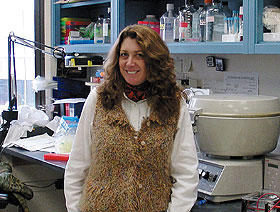  |
| HOME | THIS ISSUE | CALENDAR | GRANTS | BACK ISSUES | < BACK | NEXT > |
Researcher to study breast milk's role in preventing food allergies by Kristina Goodnough - October 6, 2008 | ||||
| Lynn Puddington, an associate professor in the Department of Immunology at the Health Center, has received a two-year, $407,000 grant from the National Institute of Allergy and Infectious Diseases as part of a new federal initiative to support research related to food allergy. Her research project considers whether exposure to food antigens in breast milk can induce tolerance in newborns and provide them with long-term protection from inflammatory responses to food allergens in the gut. Puddington is one of 12 investigators nationwide who have received grants totaling $5 million over two years to lead high-impact, innovative studies of food allergy. “Little is know about why only some people develop food allergy, and finding answers to that fundamental question is one of the key objectives of this initiative,” says NIAID director Dr. Anthony Fauci, whose institute is contributing $2 million towards the grants. Funding is also provided by two advocacy groups, the Food Allergy and Anaphylaxis Network and the Food Allergy Project. In the United States, approximately 6 percent to 8 percent of children under age 4, and 4 percent of persons age 5 and older have an allergy to one or more foods. In a two-year period, about half of all children with a food allergy will have an allergic reaction from an accidental exposure to that food, according to NIAID statistics. Severe cases can result in anaphylaxis, a condition characterized by a drop in blood pressure and difficulty breathing. About 30,000 cases of food-induced anaphylaxis occur in the United States every year and as many as 1,450 food anaphylaxis-associated deaths. Puddington’s research strategy is based on the concept that the best way to prevent harmful immune responses to food is to maximize desensitization to potential allergens as early in life as possible, before any adverse immune reaction to them can be established.
“We know from our earlier studies that low doses of antigen delivered from mother to child in breast milk is recognized by allergen-specific T cells in gut-draining lymph nodes,” says Puddington. “The T cells express FoxP3, a genetic marker of cells that provide regulatory function and prevent inflammatory diseases. We hypothesize that the acquisition of food antigens in breast milk provides the perfect context for generating focused protection by T regulatory cells in the exact site where it is needed, in the gastrointestinal tract.” Puddington hopes to determine whether the maternal breast milk antigen-induced population of T regulatory cells survives after weaning and helps to suppress development of food allergies. Her contention is that even if the protection were to last for a restricted period of time, it would be helpful in protecting infants and young children until their gut and digestive system are more developed and better able to block allergen exposure. “Mothers, particularly those who are nursing, are highly motivated to improve the health of their children,” says Puddington. “If it’s possible to modify breast milk content to enhance the development of gastrointestinal T regulatory cells in newborns, this could be an effective strategy to prevent or reduce some inflammatory diseases in the intestine and perhaps other sites as well.” |
| ADVANCE HOME UCONN HOME |

